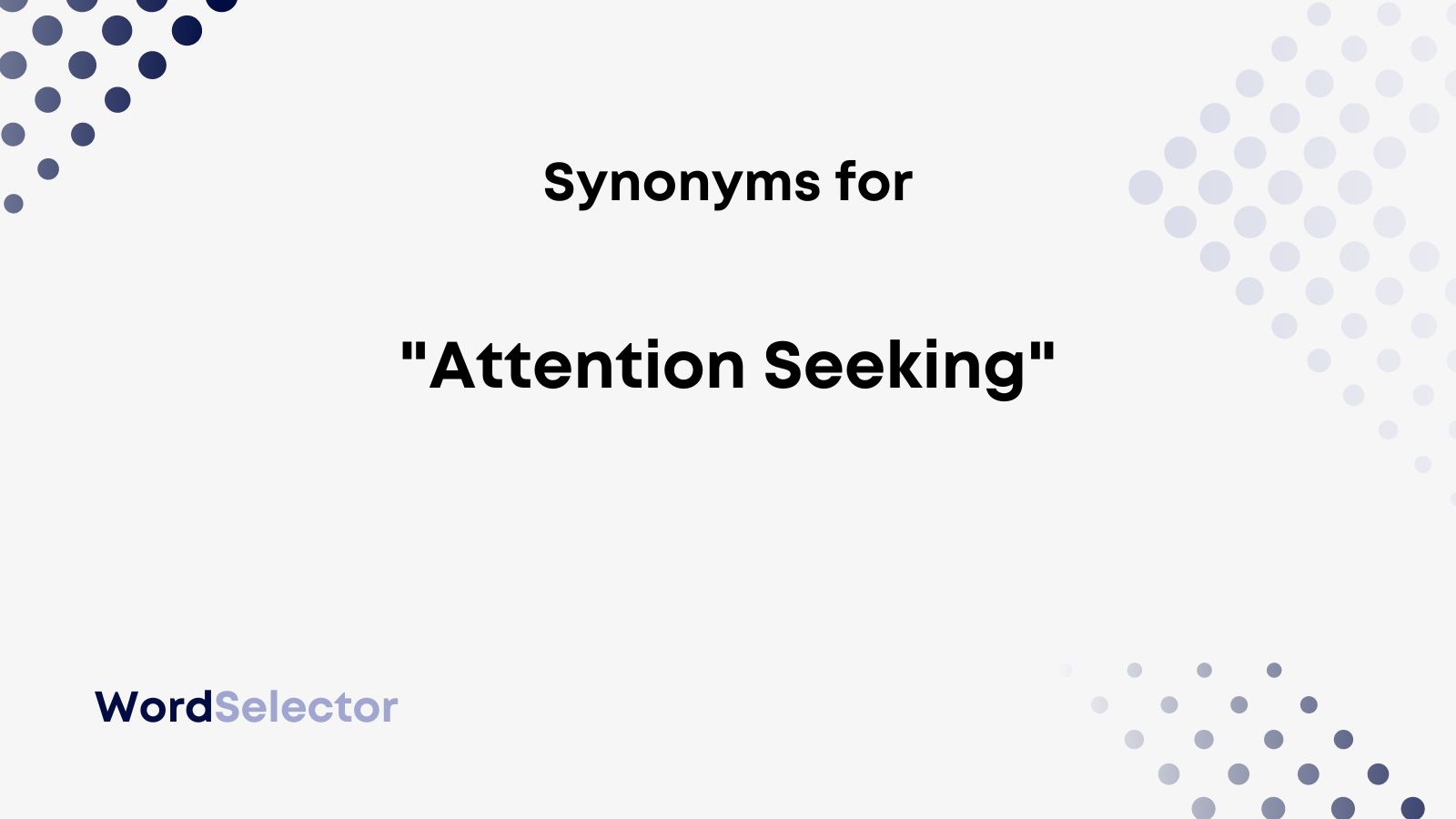Are you trying to find another word for “attention seeking” to help streamline your writing?
Perhaps you’re trying to figure out what to call a person who craves attention without being too offensive or repetitive.
Well, you’ve come to the right place to learn more.
This article will show you what to say instead of “attention seeking.”
Other Ways to Say “Attention Seeking”
- Exaggerator
- Braggart
- Boastful
- Liar
- Drama-seeking
- Spotlight-seeking
- Exhibitionist
- Narcissistic
- Self-important
- Overbearing
- Self-involved
- Self-aggrandizing
- Brash
- Needlessly flashy
- Grandstander
KEY TAKEAWAYS
- “Attention seeking” is correct and works well to address someone’s need for recognition.
- “Exaggerator” is great to use as a formal synonym to refer to someone who always embellishes stories and seeks attention
- Try using “braggart” for something more informal if you think that suits your writing better.
So, keep reading to learn another word for seeking attention. We’ve explained more regarding the best two alternatives to give you a better idea of how they might work in practice.
Or, you can skip to the final section to learn whether “attention seeking” is correct. If you’re only interested in learning more about the phrase, it might be time for you to skip ahead!
Exaggerator (Formal)
For a more professional word for “attention seeking,” try “exaggerator.”
This allows you to refer to any attention-seeking person when you know they like to embellish their stories.
For the most part, anyone who exaggerates often does it to seek more attention from their peers.
Therefore, you can use this when dismissing an employee’s remarks because you think they’re exaggerating for effect.
If you’re not impressed by their attention-seeking behavior, a term like this will help to highlight that.
You can review the following email sample if you still need help with it:
Dear Robert,
You need to calm down and stop being such an exaggeration.
People notice, and it will be harder for you to gain credibility in the future.
Best regards,
Tammy Shaw
Also, you may want to use this in academic writing.
It could be a good option to include when talking about politicians or people you don’t trust. Generally, it shows you’ve looked into their statements and realized they’re making false claims.
Here is a great example to show you more about how to use it:
It’s clear that the minister is an exaggerator based on some of his claims. It’s also true that he requires the attention of his peers.
Braggart (Informal)
Another way to say “attention seeking” is “braggart.” Generally, this works better in more informal settings.
So, you can use it when complaining to a coworker in an email.
For instance, you might notice that one of your other coworkers is always exaggerating or seeking attention.
If your colleague also spots it, it’s a good chance for you to talk about it.
Overall, the term is negative, though. So, it’s best to avoid calling someone a “braggart” directly.
This email sample will also help you to understand it better:
Hey Mike,
I told you Simon was a bit of a braggart.
It’s annoying because it seems to be working, and he’s getting in the boss’s head.
All the best,
Suzie Dent
It’s also smart to use something like this in creative writing.
For example, it could be a good opportunity for you to describe a character’s flaw. It’ll show a reader that someone is a braggart and has a lot of attention-seeking traits.
So, check out this example to learn more about how it works:
Tara is known as a braggart, which is why so many people steer clear. They tire of hearing her stories.
Is It Correct to Say “Attention Seeking”?
It is correct to say “attention seeking.”
It’s unprofessional, though. After all, referring to someone as an attention seeker is often offensive or rude.
So, you might not want to use it when writing an email.
With that said, the phrase is still correct. You might use it when writing a story or sending a message.
So, you can review this example to learn how to use “attention seeking” in a sentence:
She is attention-seeking, and I don’t know how to stop her. It’s getting annoying, and most people are noticing it.
Before using the phrase, you have to pay attention to the hyphen rules!
You must hyphenate the word. After all, it’s a compound adjective, and it usually comes before a noun.
Even when it doesn’t come before a noun, though, it is still hyphenated. You can refer to the example we provided above to see what we mean.
But you can also check out the following to remind yourself of the hyphen rules:
- Correct: He is exhibiting attention-seeking behavior.
- Incorrect: You are attention seeking.
Also, make sure you bookmark this page to remind yourself of the best synonyms for “attention seeking.” Then, you’ll always be able to come back here when it’s relevant to you.

